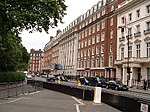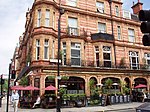Timothy Taylor (gallery)
1996 establishments in EnglandBuildings and structures in the City of WestminsterContemporary art galleries in LondonPages containing links to subscription-only contentSubscription required using via ... and 1 more
Use British English from August 2015

Timothy Taylor is a modern and contemporary art gallery in Mayfair, London, owned and founded by the art dealer Timothy Taylor. The gallery represents artists and sells original and editioned artworks across different media.
Excerpt from the Wikipedia article Timothy Taylor (gallery) (License: CC BY-SA 3.0, Authors, Images).Timothy Taylor (gallery)
Carlos Place, City of Westminster Mayfair
Geographical coordinates (GPS) Address Nearby Places Show on map
Geographical coordinates (GPS)
| Latitude | Longitude |
|---|---|
| N 51.5105 ° | E -0.1497 ° |
Address
Mayfair House
Carlos Place 14-15
W1K 3AW City of Westminster, Mayfair
England, United Kingdom
Open on Google Maps










